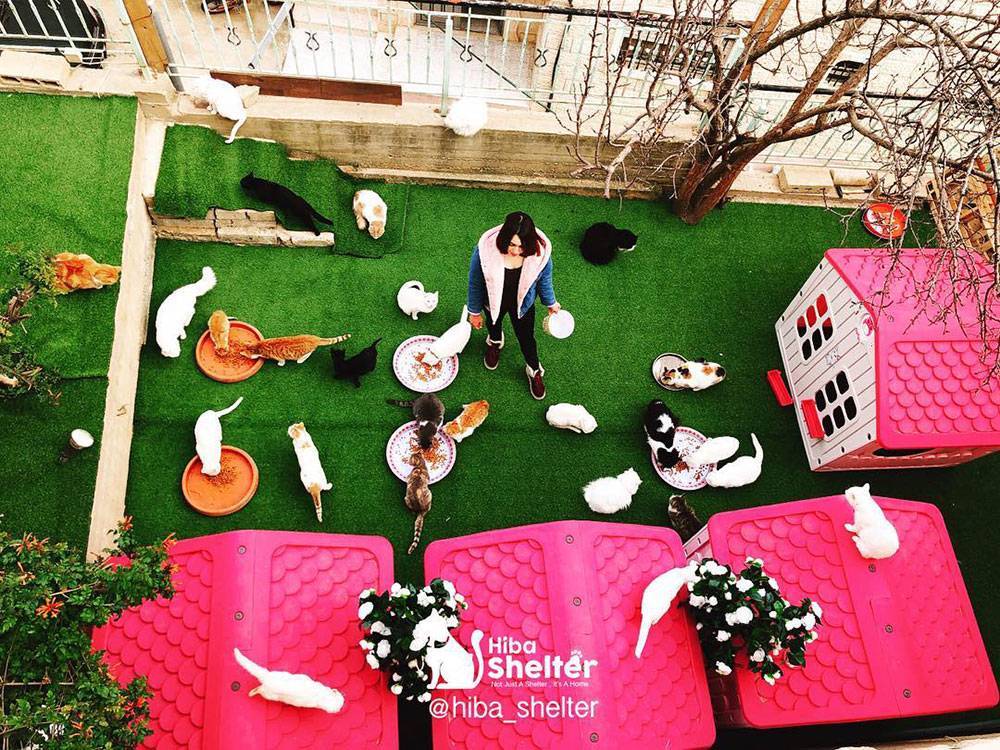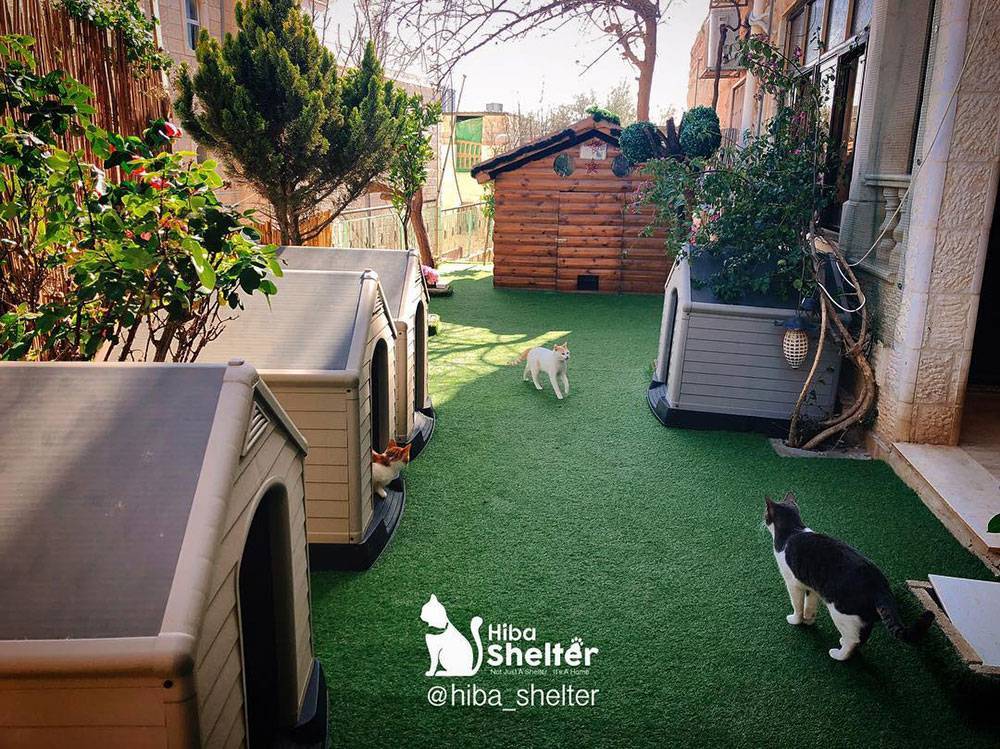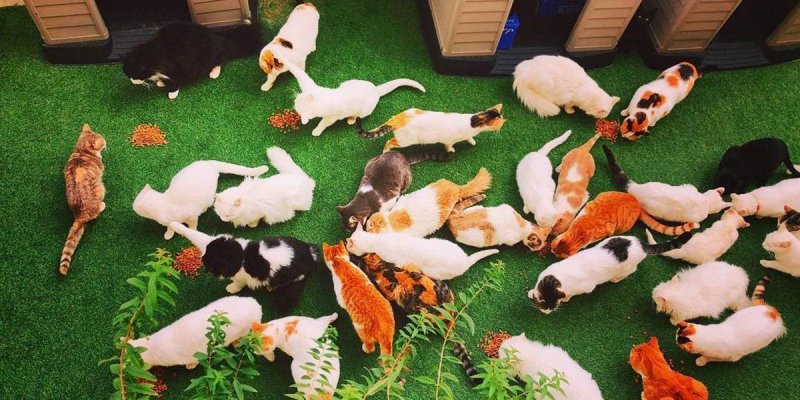In some Arab countries, animals live a difficult life and are often abused, especially if they are homeless, and they can easily die as a result of injuries sustained because of accidents or food poisoning.

In 2008, Heba Gendi, 25, met her cat Lily, and it changed her life. Gendi’s love for Lily inspired her to start helping cats in the streets of the West Bank in Palestine and provide them happy and dignified life.
"We met our first cat 12 years ago and since then we have been raising cats and caring for them," she says.
With the help of her mother, Heba eventually built a shelter that opened two years ago to provide a happy life for street cats and rescue them from suffering on the streets of the West Bank. The main goal for the shelter is to be a safe and comfortable place for felines.
"The shelter was set up in the garden of our house,” Gendi says. “It was just an ordinary rather neglected garden but now its a place for cats to eat, drink and play.”
She adds: "We have lost a lot of cats in the past. It happened through poisoning because of the cruelty to animals in our society, and others we lost because of disease and the lack of experience of veterinarians in our city and most of the Palestinian cities. Despite all these difficulties, I am trying to create a wonderful paradise for animals in the West Bank. It's a big responsibility, especially with no team to help me and with a lot of things being beyond my control."

Dozens of cats in Heba’s paradise
Gendi currently takes care of 47 cats and there is space in the shelter for 60. The priority in the shelter is for the sick street cats who need medical treatment and a safe place, then come the street cats that have no shelter and whom no-one is taking care of.
"Some people tell us about cats they have found in their area, and the cat is received based on an assessment of her health," says Gendi. "All cats deserve a happy life, but unfortunately we cannot adopt all of them, so the priority is for the sick cats, and we wish we could save more of them."
Gendi studied graphic design at Al Najah National University and is interested in photography, which helps her to showcase the new life of cats in her shelter through photos posted on her Facebook page.
Meet Heba Gendi who currently takes care of 47 street cats in the West Bank in Palestine to provide them a "dignified life".
Ever heard of Heba's paradise in Palestine? Cat lovers will definitely love this article.
Legal killing
Dogs and cats on the streets are constantly being killed by the local pest control authority, which poisons or shoots strays, a policy that Gendi opposes.
“The local authority has adopted a policy of poisoning animals with the help of government veterinary organizations,” she says. “It is constantly astonishing that these people who should be the most humane and compassionate would do such things, and it results in the death of cats and dogs in the most horrible ways imaginable.”
There is no law in Palestine that prohibits poisoning and violence against animals, which means ordinary people regularly poison street animals without reprisals.
"We are very saddened by the violent way our society deals with animals in general with an exception of a few animal lovers who support and help us morally, and we hope that we will be able to change the culture in general,” Gendi says.
A trip to the border crossing to buy food and go to the clinic
There are no good veterinary services available in the West Bank, specifically in the city of Hebron where the shelter is based. Gendi has had several bad experiences with veterinarians over the past years, and many cats have died as a result of the inexperience of local vets, as most of them consider their work to be purely commercial rather than a compassionate vocation, and consequently tend to focus on livestock, and treating cats and dogs in the same way.
As a result, she often had to take the cats to clinics in Tel Aviv for treatment. "We are currently treating the cats ourselves, and we are consulting a private veterinarian, a doctor from the town of Baqa al-Gharbiya, not from the West Bank, from time to time to perform sterilizations,” she says.
The shelter is currently setting up a private veterinary clinic, which will be equipped with basic equipment and medicines so that Gendi can provide better care for sick cats. The clinic will be set up in collaboration with a private doctor who will take care of difficult cases while Heba will take care of simpler medical tasks like vaccinations.
Often when cats come to Gendi’s shelter, they are very ill after living in the street where they often contract infectious diseases, which they then transmit to the other cats. Gendi says that the most common disease is parvo, which is often fatal especially if the cat does not receive any medical attention or vaccinations against the disease.

Moral and financial support from foreigners
The cat food best suited for the shelter cats is not generally available in the West Bank. Most shops offer low quality products, and there are some shops that offer higher quality products but are too expensive for the shelter.
In the beginning, Gendi cooperated with some local food shops to obtain scrap meat and cook it for cats, but over time the shopkeepers began to withdraw and not cooperate because they lost interest.
Heba buys her cat food from Tel Aviv, where all the products she needs are available at different prices, sizes and types. She has difficulty getting them since Palestinians are not allowed to enter Tel Aviv without permission, so she has to receive cat food through the checkpoint.
“Most of the expenses and costs of the shelter, including food are incurred by us,” says Gendi. She sometimes receives donations, most of them from foreigners. Most of those who support her financially and morally are animal lovers in other countries, with only a few local supporters.
"The cat food costs us about $500 a month, and the amount increases with the number of cats we adopt," she says. “In order to control the population of the cats, we are limiting it to male cats now since the sterilization of the male cat is easier/|
Is the shelter expanding?
Gendi is seeking to establish a shelter for dogs in the near future when circumstances allow, especially since dogs in Arab societies are often subjected to the worst kinds of cruel treatment and are in dire need of shelter. She adds that the goal of the shelter is to protect all animals whether a dog or a cat or any other animal, and she hopes to be able to achieve this goal soon.
Raseef22 is a not for profit entity. Our focus is on quality journalism. Every contribution to the NasRaseef membership goes directly towards journalism production. We stand independent, not accepting corporate sponsorships, sponsored content or political funding.
Support our mission to keep Raseef22 available to all readers by clicking here!
Interested in writing with us? Check our pitch process here!



